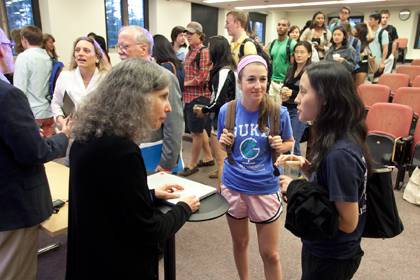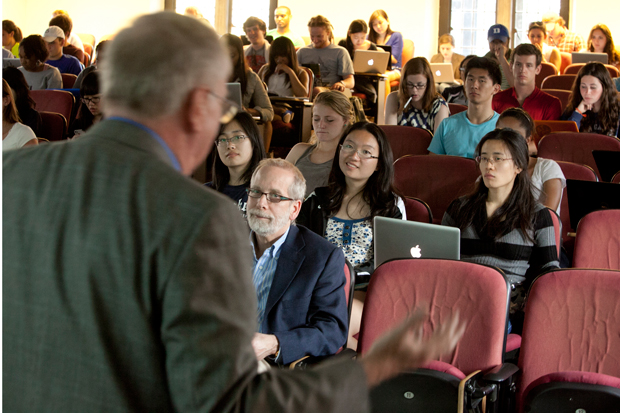
As a graduate student at the Sanford School of Public Policy, Minori Hagiwara, has a deep and established interest in issues related to water conflict and agriculture.
But in taking a recent University Course in which she worked with undergrads and learned from faculty from myriad backgrounds, Hagiwara developed a far more layered appreciation for water.
"I also got to learn about art relating to water, and religious aspects of water that I would not normally have the time to think about or read about," Hagiwara said.
That's the idea of the university course, where students of varying ages and backgrounds examine an issue from multiple vantage points. This spring, the university course examined water through the prism of everything from religion to history, engineering to literature.
The class enrolled 78 undergrads and 14 graduate and professional students.
"It's hard for us as a society to think about water, because it pervades our world," said Dean Urban, professor at the Nicholas School of the Environment and lead instructor for the course. "The aim of the course this year is to think about water from many different perspectives, so that we can understand why we are so bad at making decisions about water, and how we can become better."
"Water in a Changing World" was the second University Course, open to all students. The inaugural course last year was "Food Studies: Interdisciplinary Approaches to Why, What and How We Eat."
Trinity College Dean Laurie Patton started the university courses so students could work with scholars in other disciplines "to tackle the large, complex issues that are part of our world today."
During one of the last Tuesday class sessions, Professor John Payne of the Fuqua School of Business and Priscilla Wald of English and Women's Studies brought that interdisciplinary approach to the shared classroom to talk about how people's biases and language affected water policy.
Payne discussed how the psychology of uncertainty influences our decisions, using examples from water policy. "We search out information in ways that confirm what we already believe, magnified if what we believe to be true is also what we want to be true. The biases we are talking about occur not only with unintelligent or badly motivated people -- they occur for everyone, because our brains tend to work in the same ways," Payne said.
Payne's advice to students: "Get in the habit of thinking about how you could be wrong, particularly in terms of something you don't want to happen. Understand how you normally think about things, biases and all, and use that to help yourself make better decisions."
Wald told students that how they talk about water is almost as important as what they do with it. She cited Rachel Carson's Silent Spring, one of the most influential pieces of environmental writing in history, noting how Carson's choice of language evoked similarities between the earth and the human body and made connections between humans and the earth.
"What are the words, metaphors, and scenarios that we are choosing? How is it being portrayed in mainstream media, both in writing and visually? What are the water stories that are circulating, both in this class and in our culture?" Wald asked.
The interdisciplinary focus was a draw for Ukyoung Chan, a Trinity first-year student. "For me, it provides a constant novelty -- it's not like other courses that center around one theme or one topic. In this one you get a whole new story and topic and narrative each week," Chang said.
Students also worked with classmates from different disciplines in small group discussion sessions.
"I think it's really cool that you get to take the class with so many different people from so many different disciplines. I never would have met anyone here if it wasn't for this class," said Mary Wilson, a Trinity first-year student.
This synthesis of ideas and disciplines and practices is what the University Course is all about, Patton said. Patton said she hopes it will be possible to have a university course that the entire campus engages in every year, with co-sponsorship from a different school within Duke each time.
"The course is training students, faculty, and staff alike to find different ways to talk about their expertise, so that others from different backgrounds can understand and recognize the relevance to larger issues," Patton said. "We want to train people to realize that there's always something to say, especially across disciplines, when we're focusing on issues that concern all of us."
Below: The class discussion on water. Photo by Les Todd/Duke University Photography
